Leadership and Management: Steve Jobs and Apple Inc. Analysis Report
VerifiedAdded on 2021/06/17
|11
|3397
|59
Report
AI Summary
This report provides a comprehensive analysis of leadership and management practices at Apple Inc., focusing on the contributions of Steve Jobs and Tim Cook. It delves into Steve Jobs' charismatic leadership style, identifying its characteristics and impact on the organization's culture and success. The report explores the adoption of an autocratic management style by Jobs, highlighting the power dynamics and their influence on office politics. It also examines how leadership, management, and power affect the organizational culture and overall effectiveness of Apple Inc. The report further identifies the leadership and management styles, theories, qualities, leadership behaviors and types of authority/power adopted by Tim Cook for the purpose of managing the organization.
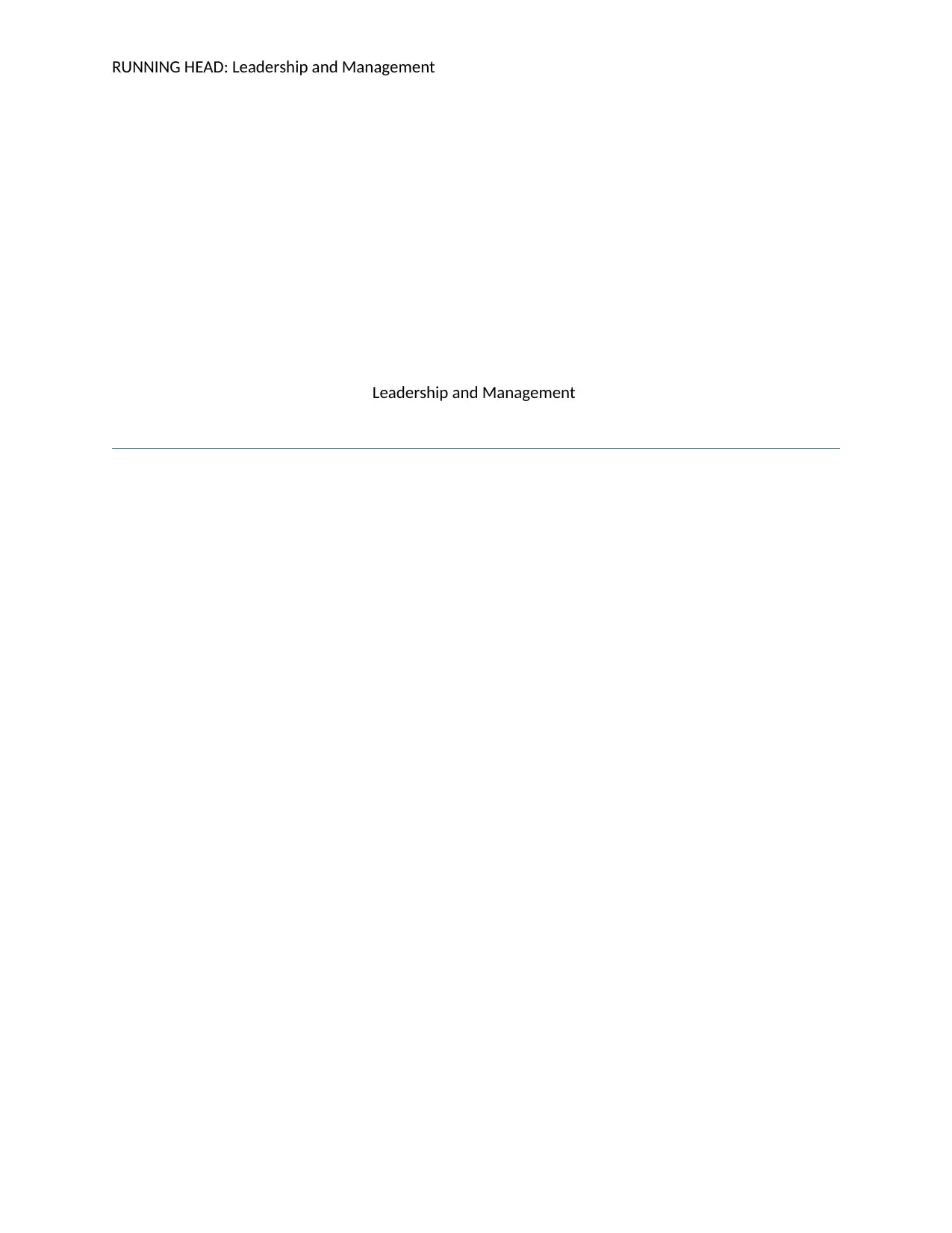
RUNNING HEAD: Leadership and Management
Leadership and Management
Leadership and Management
Paraphrase This Document
Need a fresh take? Get an instant paraphrase of this document with our AI Paraphraser
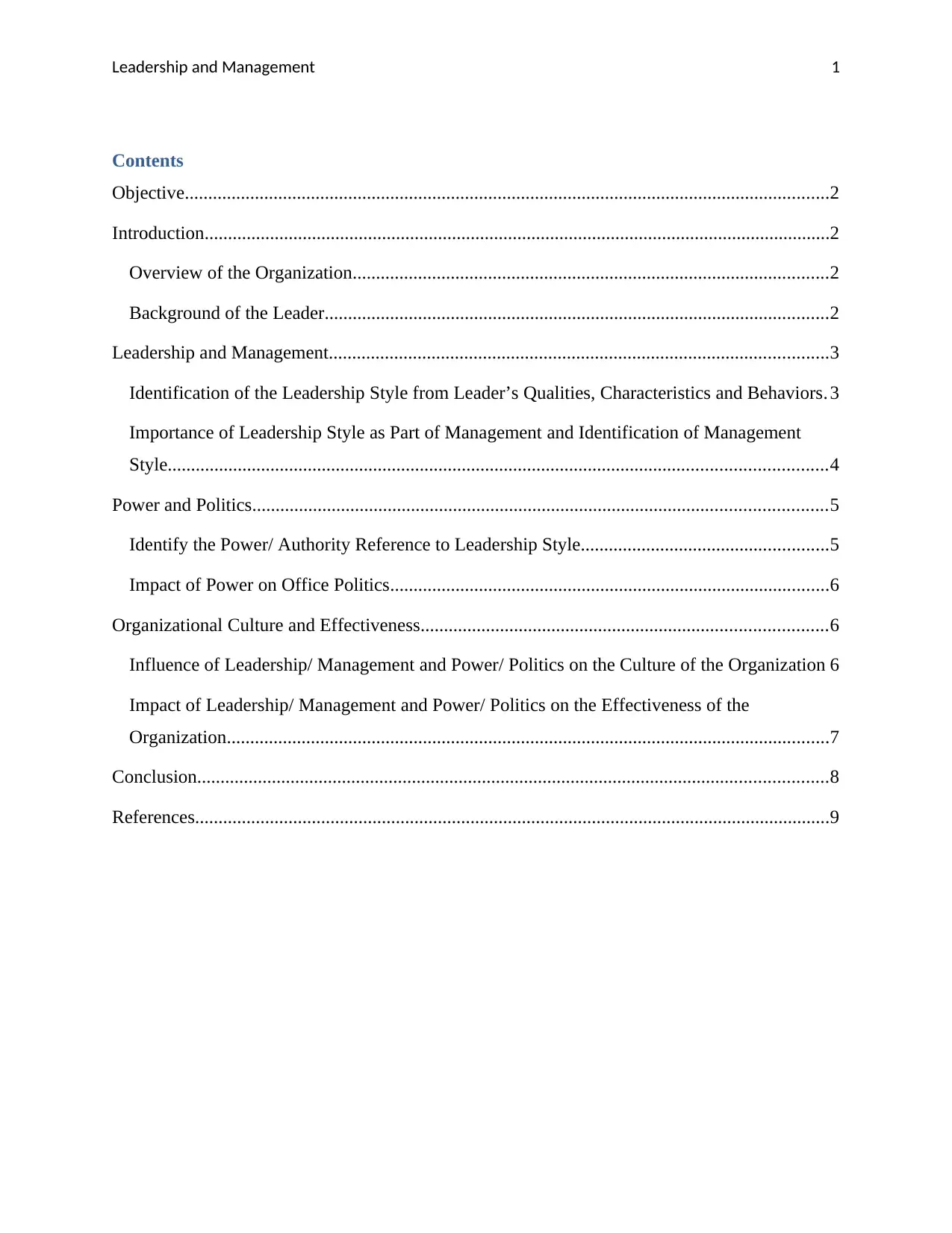
Leadership and Management 1
Contents
Objective..........................................................................................................................................2
Introduction......................................................................................................................................2
Overview of the Organization......................................................................................................2
Background of the Leader............................................................................................................2
Leadership and Management...........................................................................................................3
Identification of the Leadership Style from Leader’s Qualities, Characteristics and Behaviors. 3
Importance of Leadership Style as Part of Management and Identification of Management
Style.............................................................................................................................................4
Power and Politics...........................................................................................................................5
Identify the Power/ Authority Reference to Leadership Style.....................................................5
Impact of Power on Office Politics..............................................................................................6
Organizational Culture and Effectiveness.......................................................................................6
Influence of Leadership/ Management and Power/ Politics on the Culture of the Organization 6
Impact of Leadership/ Management and Power/ Politics on the Effectiveness of the
Organization.................................................................................................................................7
Conclusion.......................................................................................................................................8
References........................................................................................................................................9
Contents
Objective..........................................................................................................................................2
Introduction......................................................................................................................................2
Overview of the Organization......................................................................................................2
Background of the Leader............................................................................................................2
Leadership and Management...........................................................................................................3
Identification of the Leadership Style from Leader’s Qualities, Characteristics and Behaviors. 3
Importance of Leadership Style as Part of Management and Identification of Management
Style.............................................................................................................................................4
Power and Politics...........................................................................................................................5
Identify the Power/ Authority Reference to Leadership Style.....................................................5
Impact of Power on Office Politics..............................................................................................6
Organizational Culture and Effectiveness.......................................................................................6
Influence of Leadership/ Management and Power/ Politics on the Culture of the Organization 6
Impact of Leadership/ Management and Power/ Politics on the Effectiveness of the
Organization.................................................................................................................................7
Conclusion.......................................................................................................................................8
References........................................................................................................................................9
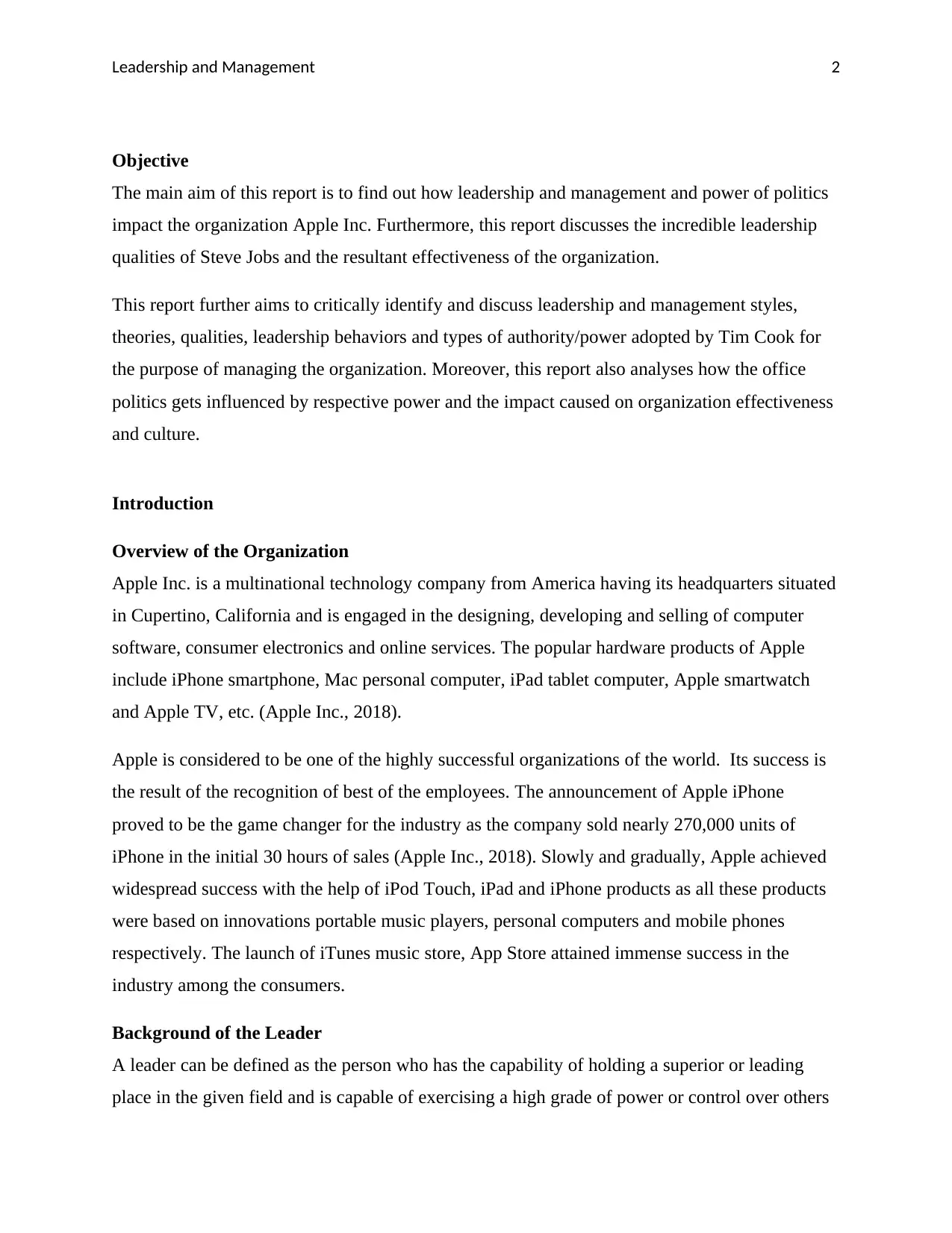
Leadership and Management 2
Objective
The main aim of this report is to find out how leadership and management and power of politics
impact the organization Apple Inc. Furthermore, this report discusses the incredible leadership
qualities of Steve Jobs and the resultant effectiveness of the organization.
This report further aims to critically identify and discuss leadership and management styles,
theories, qualities, leadership behaviors and types of authority/power adopted by Tim Cook for
the purpose of managing the organization. Moreover, this report also analyses how the office
politics gets influenced by respective power and the impact caused on organization effectiveness
and culture.
Introduction
Overview of the Organization
Apple Inc. is a multinational technology company from America having its headquarters situated
in Cupertino, California and is engaged in the designing, developing and selling of computer
software, consumer electronics and online services. The popular hardware products of Apple
include iPhone smartphone, Mac personal computer, iPad tablet computer, Apple smartwatch
and Apple TV, etc. (Apple Inc., 2018).
Apple is considered to be one of the highly successful organizations of the world. Its success is
the result of the recognition of best of the employees. The announcement of Apple iPhone
proved to be the game changer for the industry as the company sold nearly 270,000 units of
iPhone in the initial 30 hours of sales (Apple Inc., 2018). Slowly and gradually, Apple achieved
widespread success with the help of iPod Touch, iPad and iPhone products as all these products
were based on innovations portable music players, personal computers and mobile phones
respectively. The launch of iTunes music store, App Store attained immense success in the
industry among the consumers.
Background of the Leader
A leader can be defined as the person who has the capability of holding a superior or leading
place in the given field and is capable of exercising a high grade of power or control over others
Objective
The main aim of this report is to find out how leadership and management and power of politics
impact the organization Apple Inc. Furthermore, this report discusses the incredible leadership
qualities of Steve Jobs and the resultant effectiveness of the organization.
This report further aims to critically identify and discuss leadership and management styles,
theories, qualities, leadership behaviors and types of authority/power adopted by Tim Cook for
the purpose of managing the organization. Moreover, this report also analyses how the office
politics gets influenced by respective power and the impact caused on organization effectiveness
and culture.
Introduction
Overview of the Organization
Apple Inc. is a multinational technology company from America having its headquarters situated
in Cupertino, California and is engaged in the designing, developing and selling of computer
software, consumer electronics and online services. The popular hardware products of Apple
include iPhone smartphone, Mac personal computer, iPad tablet computer, Apple smartwatch
and Apple TV, etc. (Apple Inc., 2018).
Apple is considered to be one of the highly successful organizations of the world. Its success is
the result of the recognition of best of the employees. The announcement of Apple iPhone
proved to be the game changer for the industry as the company sold nearly 270,000 units of
iPhone in the initial 30 hours of sales (Apple Inc., 2018). Slowly and gradually, Apple achieved
widespread success with the help of iPod Touch, iPad and iPhone products as all these products
were based on innovations portable music players, personal computers and mobile phones
respectively. The launch of iTunes music store, App Store attained immense success in the
industry among the consumers.
Background of the Leader
A leader can be defined as the person who has the capability of holding a superior or leading
place in the given field and is capable of exercising a high grade of power or control over others
⊘ This is a preview!⊘
Do you want full access?
Subscribe today to unlock all pages.

Trusted by 1+ million students worldwide
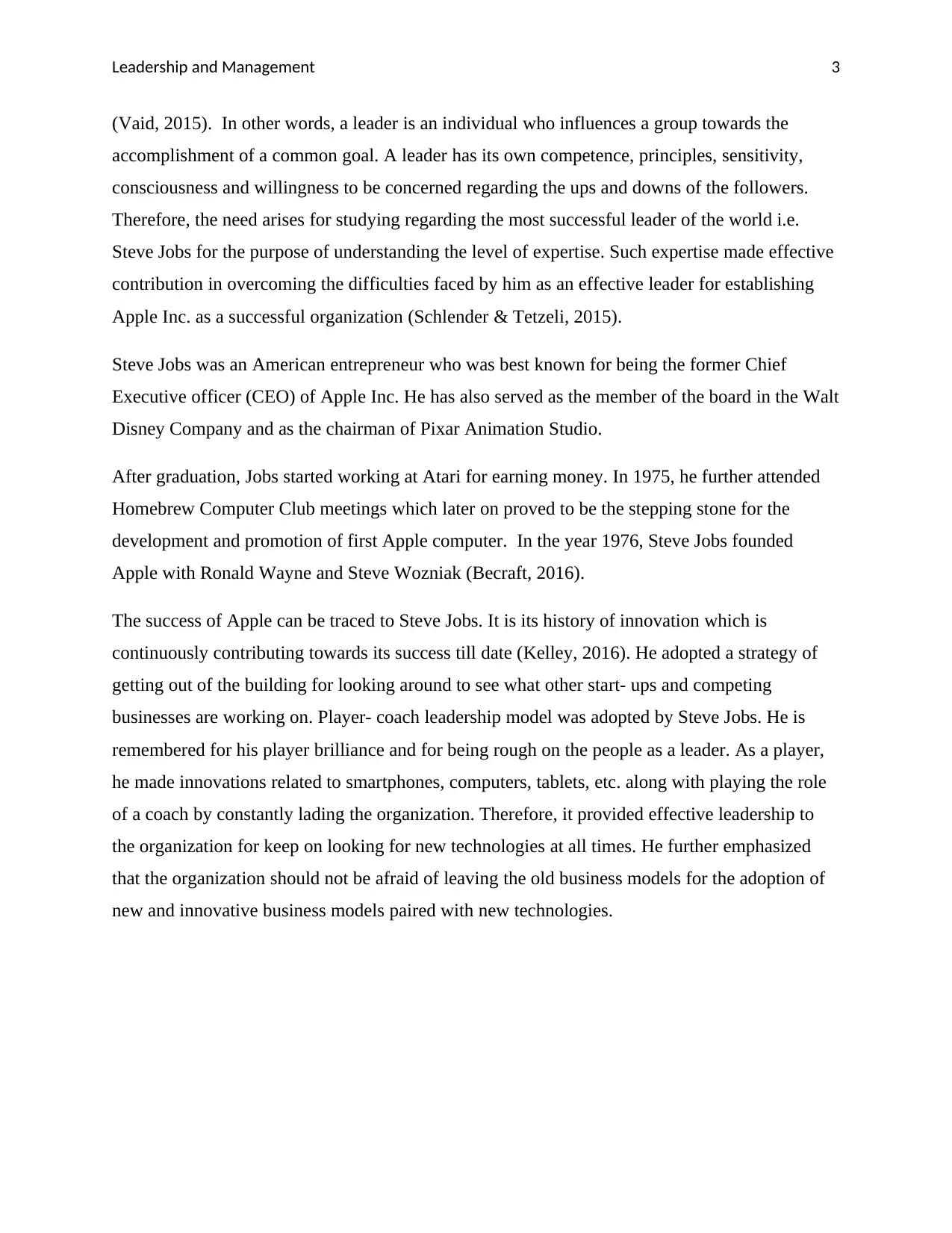
Leadership and Management 3
(Vaid, 2015). In other words, a leader is an individual who influences a group towards the
accomplishment of a common goal. A leader has its own competence, principles, sensitivity,
consciousness and willingness to be concerned regarding the ups and downs of the followers.
Therefore, the need arises for studying regarding the most successful leader of the world i.e.
Steve Jobs for the purpose of understanding the level of expertise. Such expertise made effective
contribution in overcoming the difficulties faced by him as an effective leader for establishing
Apple Inc. as a successful organization (Schlender & Tetzeli, 2015).
Steve Jobs was an American entrepreneur who was best known for being the former Chief
Executive officer (CEO) of Apple Inc. He has also served as the member of the board in the Walt
Disney Company and as the chairman of Pixar Animation Studio.
After graduation, Jobs started working at Atari for earning money. In 1975, he further attended
Homebrew Computer Club meetings which later on proved to be the stepping stone for the
development and promotion of first Apple computer. In the year 1976, Steve Jobs founded
Apple with Ronald Wayne and Steve Wozniak (Becraft, 2016).
The success of Apple can be traced to Steve Jobs. It is its history of innovation which is
continuously contributing towards its success till date (Kelley, 2016). He adopted a strategy of
getting out of the building for looking around to see what other start- ups and competing
businesses are working on. Player- coach leadership model was adopted by Steve Jobs. He is
remembered for his player brilliance and for being rough on the people as a leader. As a player,
he made innovations related to smartphones, computers, tablets, etc. along with playing the role
of a coach by constantly lading the organization. Therefore, it provided effective leadership to
the organization for keep on looking for new technologies at all times. He further emphasized
that the organization should not be afraid of leaving the old business models for the adoption of
new and innovative business models paired with new technologies.
(Vaid, 2015). In other words, a leader is an individual who influences a group towards the
accomplishment of a common goal. A leader has its own competence, principles, sensitivity,
consciousness and willingness to be concerned regarding the ups and downs of the followers.
Therefore, the need arises for studying regarding the most successful leader of the world i.e.
Steve Jobs for the purpose of understanding the level of expertise. Such expertise made effective
contribution in overcoming the difficulties faced by him as an effective leader for establishing
Apple Inc. as a successful organization (Schlender & Tetzeli, 2015).
Steve Jobs was an American entrepreneur who was best known for being the former Chief
Executive officer (CEO) of Apple Inc. He has also served as the member of the board in the Walt
Disney Company and as the chairman of Pixar Animation Studio.
After graduation, Jobs started working at Atari for earning money. In 1975, he further attended
Homebrew Computer Club meetings which later on proved to be the stepping stone for the
development and promotion of first Apple computer. In the year 1976, Steve Jobs founded
Apple with Ronald Wayne and Steve Wozniak (Becraft, 2016).
The success of Apple can be traced to Steve Jobs. It is its history of innovation which is
continuously contributing towards its success till date (Kelley, 2016). He adopted a strategy of
getting out of the building for looking around to see what other start- ups and competing
businesses are working on. Player- coach leadership model was adopted by Steve Jobs. He is
remembered for his player brilliance and for being rough on the people as a leader. As a player,
he made innovations related to smartphones, computers, tablets, etc. along with playing the role
of a coach by constantly lading the organization. Therefore, it provided effective leadership to
the organization for keep on looking for new technologies at all times. He further emphasized
that the organization should not be afraid of leaving the old business models for the adoption of
new and innovative business models paired with new technologies.
Paraphrase This Document
Need a fresh take? Get an instant paraphrase of this document with our AI Paraphraser
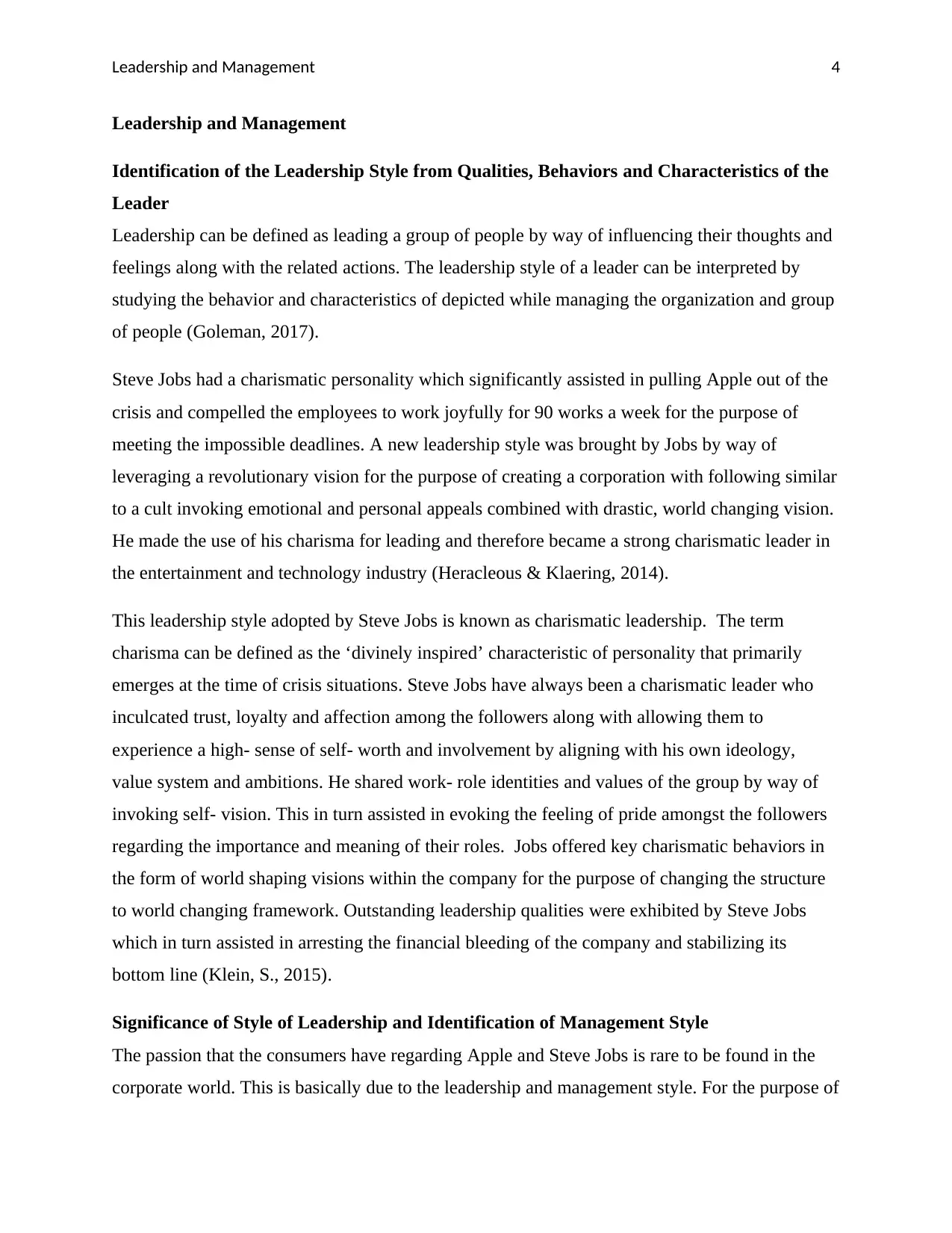
Leadership and Management 4
Leadership and Management
Identification of the Leadership Style from Qualities, Behaviors and Characteristics of the
Leader
Leadership can be defined as leading a group of people by way of influencing their thoughts and
feelings along with the related actions. The leadership style of a leader can be interpreted by
studying the behavior and characteristics of depicted while managing the organization and group
of people (Goleman, 2017).
Steve Jobs had a charismatic personality which significantly assisted in pulling Apple out of the
crisis and compelled the employees to work joyfully for 90 works a week for the purpose of
meeting the impossible deadlines. A new leadership style was brought by Jobs by way of
leveraging a revolutionary vision for the purpose of creating a corporation with following similar
to a cult invoking emotional and personal appeals combined with drastic, world changing vision.
He made the use of his charisma for leading and therefore became a strong charismatic leader in
the entertainment and technology industry (Heracleous & Klaering, 2014).
This leadership style adopted by Steve Jobs is known as charismatic leadership. The term
charisma can be defined as the ‘divinely inspired’ characteristic of personality that primarily
emerges at the time of crisis situations. Steve Jobs have always been a charismatic leader who
inculcated trust, loyalty and affection among the followers along with allowing them to
experience a high- sense of self- worth and involvement by aligning with his own ideology,
value system and ambitions. He shared work- role identities and values of the group by way of
invoking self- vision. This in turn assisted in evoking the feeling of pride amongst the followers
regarding the importance and meaning of their roles. Jobs offered key charismatic behaviors in
the form of world shaping visions within the company for the purpose of changing the structure
to world changing framework. Outstanding leadership qualities were exhibited by Steve Jobs
which in turn assisted in arresting the financial bleeding of the company and stabilizing its
bottom line (Klein, S., 2015).
Significance of Style of Leadership and Identification of Management Style
The passion that the consumers have regarding Apple and Steve Jobs is rare to be found in the
corporate world. This is basically due to the leadership and management style. For the purpose of
Leadership and Management
Identification of the Leadership Style from Qualities, Behaviors and Characteristics of the
Leader
Leadership can be defined as leading a group of people by way of influencing their thoughts and
feelings along with the related actions. The leadership style of a leader can be interpreted by
studying the behavior and characteristics of depicted while managing the organization and group
of people (Goleman, 2017).
Steve Jobs had a charismatic personality which significantly assisted in pulling Apple out of the
crisis and compelled the employees to work joyfully for 90 works a week for the purpose of
meeting the impossible deadlines. A new leadership style was brought by Jobs by way of
leveraging a revolutionary vision for the purpose of creating a corporation with following similar
to a cult invoking emotional and personal appeals combined with drastic, world changing vision.
He made the use of his charisma for leading and therefore became a strong charismatic leader in
the entertainment and technology industry (Heracleous & Klaering, 2014).
This leadership style adopted by Steve Jobs is known as charismatic leadership. The term
charisma can be defined as the ‘divinely inspired’ characteristic of personality that primarily
emerges at the time of crisis situations. Steve Jobs have always been a charismatic leader who
inculcated trust, loyalty and affection among the followers along with allowing them to
experience a high- sense of self- worth and involvement by aligning with his own ideology,
value system and ambitions. He shared work- role identities and values of the group by way of
invoking self- vision. This in turn assisted in evoking the feeling of pride amongst the followers
regarding the importance and meaning of their roles. Jobs offered key charismatic behaviors in
the form of world shaping visions within the company for the purpose of changing the structure
to world changing framework. Outstanding leadership qualities were exhibited by Steve Jobs
which in turn assisted in arresting the financial bleeding of the company and stabilizing its
bottom line (Klein, S., 2015).
Significance of Style of Leadership and Identification of Management Style
The passion that the consumers have regarding Apple and Steve Jobs is rare to be found in the
corporate world. This is basically due to the leadership and management style. For the purpose of
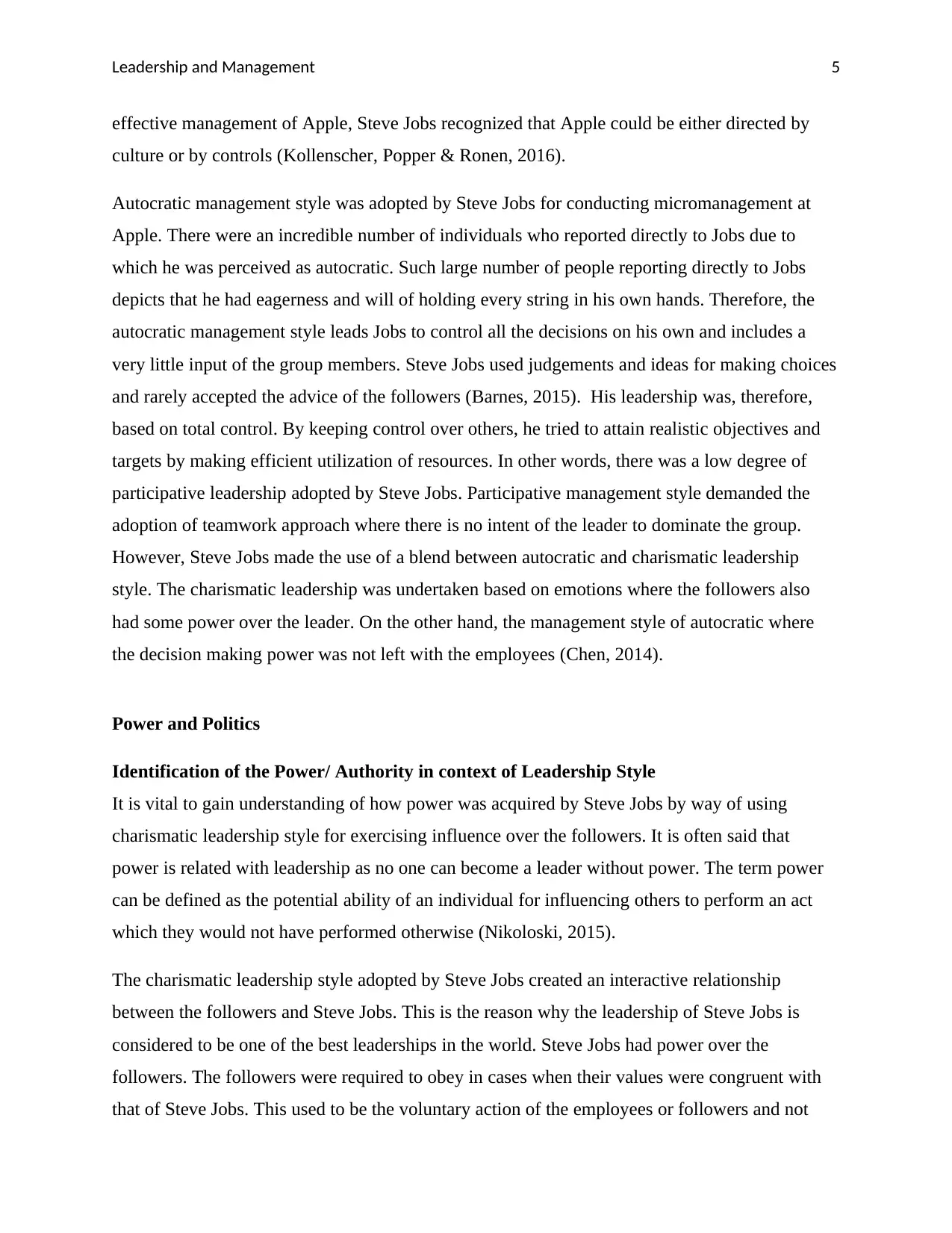
Leadership and Management 5
effective management of Apple, Steve Jobs recognized that Apple could be either directed by
culture or by controls (Kollenscher, Popper & Ronen, 2016).
Autocratic management style was adopted by Steve Jobs for conducting micromanagement at
Apple. There were an incredible number of individuals who reported directly to Jobs due to
which he was perceived as autocratic. Such large number of people reporting directly to Jobs
depicts that he had eagerness and will of holding every string in his own hands. Therefore, the
autocratic management style leads Jobs to control all the decisions on his own and includes a
very little input of the group members. Steve Jobs used judgements and ideas for making choices
and rarely accepted the advice of the followers (Barnes, 2015). His leadership was, therefore,
based on total control. By keeping control over others, he tried to attain realistic objectives and
targets by making efficient utilization of resources. In other words, there was a low degree of
participative leadership adopted by Steve Jobs. Participative management style demanded the
adoption of teamwork approach where there is no intent of the leader to dominate the group.
However, Steve Jobs made the use of a blend between autocratic and charismatic leadership
style. The charismatic leadership was undertaken based on emotions where the followers also
had some power over the leader. On the other hand, the management style of autocratic where
the decision making power was not left with the employees (Chen, 2014).
Power and Politics
Identification of the Power/ Authority in context of Leadership Style
It is vital to gain understanding of how power was acquired by Steve Jobs by way of using
charismatic leadership style for exercising influence over the followers. It is often said that
power is related with leadership as no one can become a leader without power. The term power
can be defined as the potential ability of an individual for influencing others to perform an act
which they would not have performed otherwise (Nikoloski, 2015).
The charismatic leadership style adopted by Steve Jobs created an interactive relationship
between the followers and Steve Jobs. This is the reason why the leadership of Steve Jobs is
considered to be one of the best leaderships in the world. Steve Jobs had power over the
followers. The followers were required to obey in cases when their values were congruent with
that of Steve Jobs. This used to be the voluntary action of the employees or followers and not
effective management of Apple, Steve Jobs recognized that Apple could be either directed by
culture or by controls (Kollenscher, Popper & Ronen, 2016).
Autocratic management style was adopted by Steve Jobs for conducting micromanagement at
Apple. There were an incredible number of individuals who reported directly to Jobs due to
which he was perceived as autocratic. Such large number of people reporting directly to Jobs
depicts that he had eagerness and will of holding every string in his own hands. Therefore, the
autocratic management style leads Jobs to control all the decisions on his own and includes a
very little input of the group members. Steve Jobs used judgements and ideas for making choices
and rarely accepted the advice of the followers (Barnes, 2015). His leadership was, therefore,
based on total control. By keeping control over others, he tried to attain realistic objectives and
targets by making efficient utilization of resources. In other words, there was a low degree of
participative leadership adopted by Steve Jobs. Participative management style demanded the
adoption of teamwork approach where there is no intent of the leader to dominate the group.
However, Steve Jobs made the use of a blend between autocratic and charismatic leadership
style. The charismatic leadership was undertaken based on emotions where the followers also
had some power over the leader. On the other hand, the management style of autocratic where
the decision making power was not left with the employees (Chen, 2014).
Power and Politics
Identification of the Power/ Authority in context of Leadership Style
It is vital to gain understanding of how power was acquired by Steve Jobs by way of using
charismatic leadership style for exercising influence over the followers. It is often said that
power is related with leadership as no one can become a leader without power. The term power
can be defined as the potential ability of an individual for influencing others to perform an act
which they would not have performed otherwise (Nikoloski, 2015).
The charismatic leadership style adopted by Steve Jobs created an interactive relationship
between the followers and Steve Jobs. This is the reason why the leadership of Steve Jobs is
considered to be one of the best leaderships in the world. Steve Jobs had power over the
followers. The followers were required to obey in cases when their values were congruent with
that of Steve Jobs. This used to be the voluntary action of the employees or followers and not
⊘ This is a preview!⊘
Do you want full access?
Subscribe today to unlock all pages.

Trusted by 1+ million students worldwide
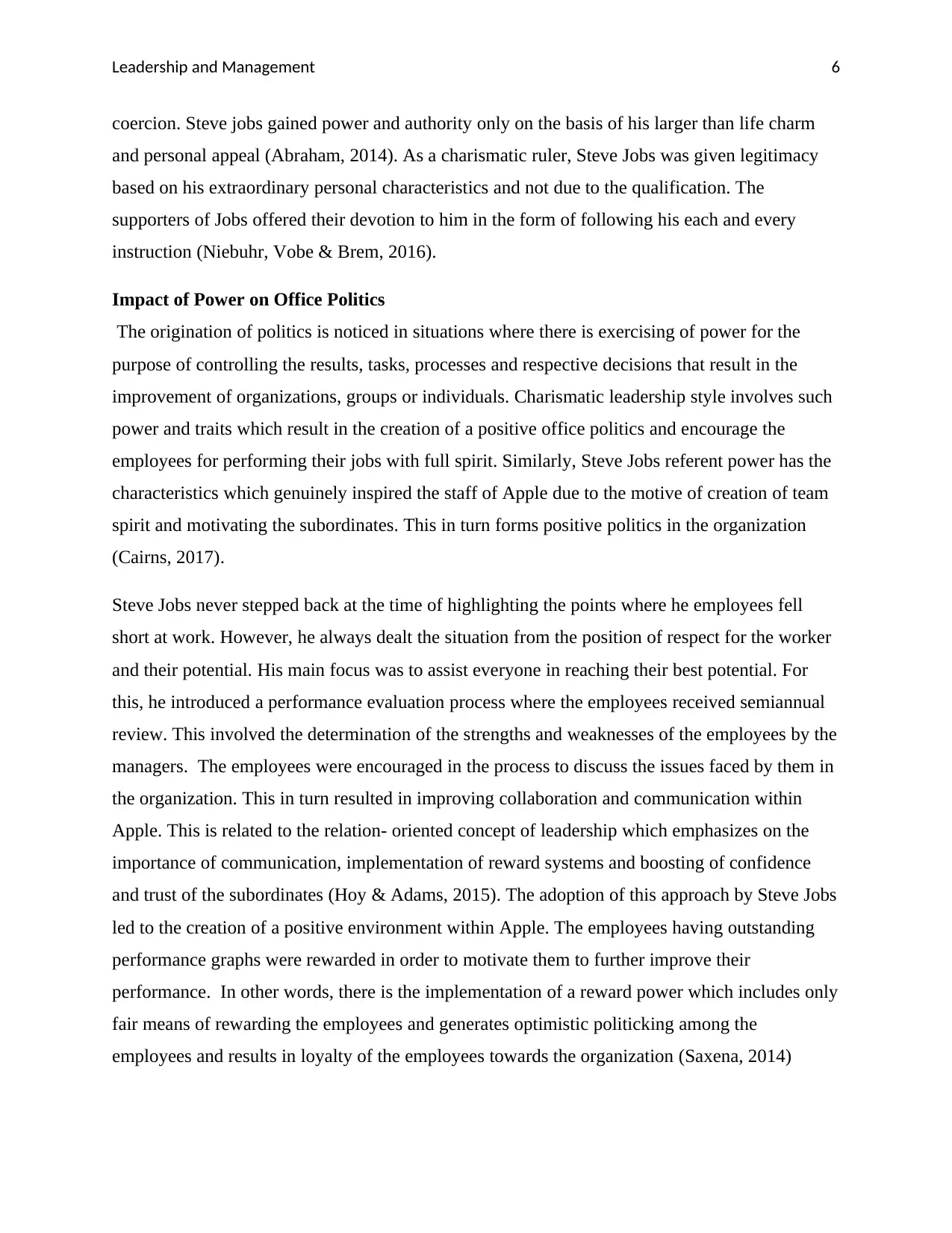
Leadership and Management 6
coercion. Steve jobs gained power and authority only on the basis of his larger than life charm
and personal appeal (Abraham, 2014). As a charismatic ruler, Steve Jobs was given legitimacy
based on his extraordinary personal characteristics and not due to the qualification. The
supporters of Jobs offered their devotion to him in the form of following his each and every
instruction (Niebuhr, Vobe & Brem, 2016).
Impact of Power on Office Politics
The origination of politics is noticed in situations where there is exercising of power for the
purpose of controlling the results, tasks, processes and respective decisions that result in the
improvement of organizations, groups or individuals. Charismatic leadership style involves such
power and traits which result in the creation of a positive office politics and encourage the
employees for performing their jobs with full spirit. Similarly, Steve Jobs referent power has the
characteristics which genuinely inspired the staff of Apple due to the motive of creation of team
spirit and motivating the subordinates. This in turn forms positive politics in the organization
(Cairns, 2017).
Steve Jobs never stepped back at the time of highlighting the points where he employees fell
short at work. However, he always dealt the situation from the position of respect for the worker
and their potential. His main focus was to assist everyone in reaching their best potential. For
this, he introduced a performance evaluation process where the employees received semiannual
review. This involved the determination of the strengths and weaknesses of the employees by the
managers. The employees were encouraged in the process to discuss the issues faced by them in
the organization. This in turn resulted in improving collaboration and communication within
Apple. This is related to the relation- oriented concept of leadership which emphasizes on the
importance of communication, implementation of reward systems and boosting of confidence
and trust of the subordinates (Hoy & Adams, 2015). The adoption of this approach by Steve Jobs
led to the creation of a positive environment within Apple. The employees having outstanding
performance graphs were rewarded in order to motivate them to further improve their
performance. In other words, there is the implementation of a reward power which includes only
fair means of rewarding the employees and generates optimistic politicking among the
employees and results in loyalty of the employees towards the organization (Saxena, 2014)
coercion. Steve jobs gained power and authority only on the basis of his larger than life charm
and personal appeal (Abraham, 2014). As a charismatic ruler, Steve Jobs was given legitimacy
based on his extraordinary personal characteristics and not due to the qualification. The
supporters of Jobs offered their devotion to him in the form of following his each and every
instruction (Niebuhr, Vobe & Brem, 2016).
Impact of Power on Office Politics
The origination of politics is noticed in situations where there is exercising of power for the
purpose of controlling the results, tasks, processes and respective decisions that result in the
improvement of organizations, groups or individuals. Charismatic leadership style involves such
power and traits which result in the creation of a positive office politics and encourage the
employees for performing their jobs with full spirit. Similarly, Steve Jobs referent power has the
characteristics which genuinely inspired the staff of Apple due to the motive of creation of team
spirit and motivating the subordinates. This in turn forms positive politics in the organization
(Cairns, 2017).
Steve Jobs never stepped back at the time of highlighting the points where he employees fell
short at work. However, he always dealt the situation from the position of respect for the worker
and their potential. His main focus was to assist everyone in reaching their best potential. For
this, he introduced a performance evaluation process where the employees received semiannual
review. This involved the determination of the strengths and weaknesses of the employees by the
managers. The employees were encouraged in the process to discuss the issues faced by them in
the organization. This in turn resulted in improving collaboration and communication within
Apple. This is related to the relation- oriented concept of leadership which emphasizes on the
importance of communication, implementation of reward systems and boosting of confidence
and trust of the subordinates (Hoy & Adams, 2015). The adoption of this approach by Steve Jobs
led to the creation of a positive environment within Apple. The employees having outstanding
performance graphs were rewarded in order to motivate them to further improve their
performance. In other words, there is the implementation of a reward power which includes only
fair means of rewarding the employees and generates optimistic politicking among the
employees and results in loyalty of the employees towards the organization (Saxena, 2014)
Paraphrase This Document
Need a fresh take? Get an instant paraphrase of this document with our AI Paraphraser
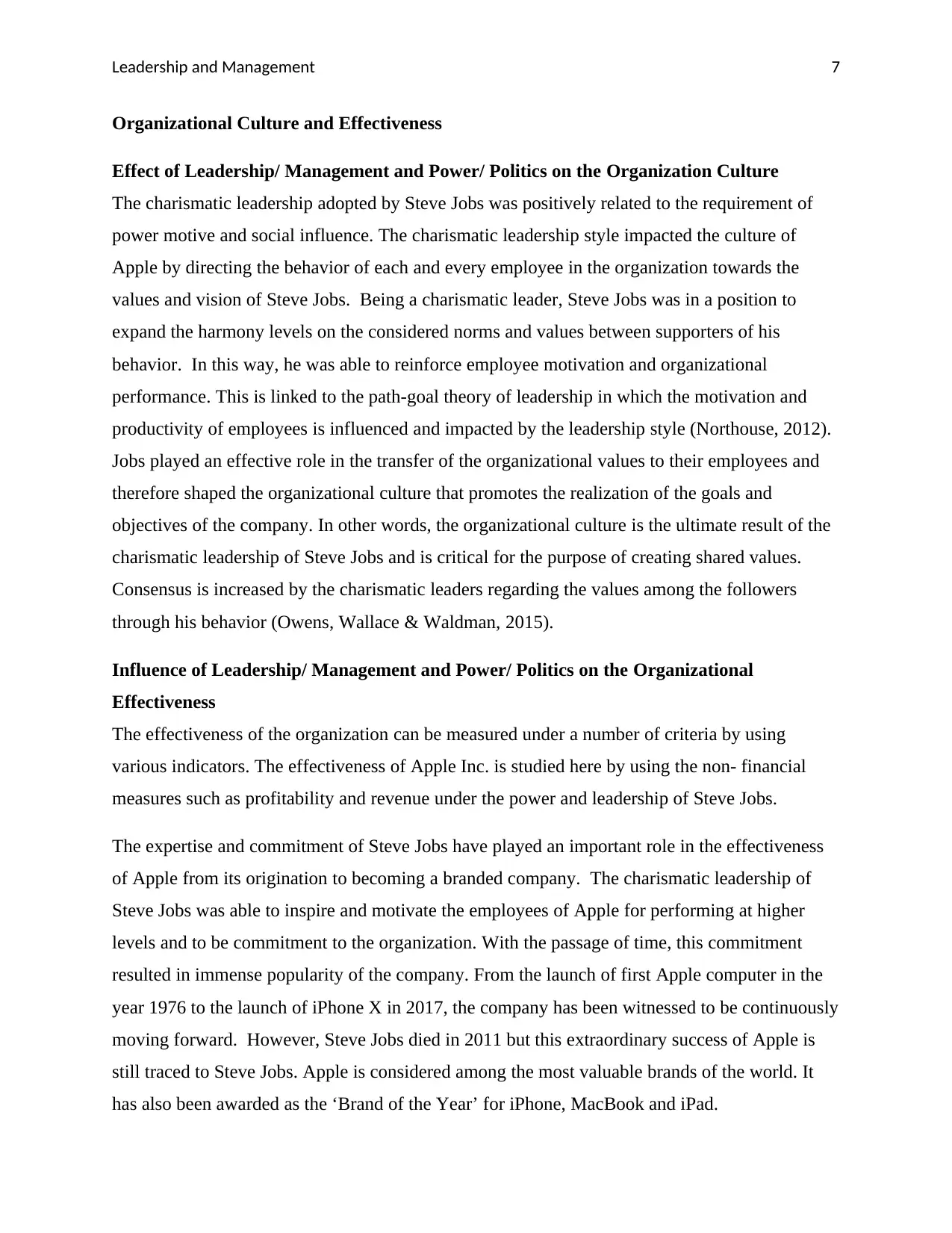
Leadership and Management 7
Organizational Culture and Effectiveness
Effect of Leadership/ Management and Power/ Politics on the Organization Culture
The charismatic leadership adopted by Steve Jobs was positively related to the requirement of
power motive and social influence. The charismatic leadership style impacted the culture of
Apple by directing the behavior of each and every employee in the organization towards the
values and vision of Steve Jobs. Being a charismatic leader, Steve Jobs was in a position to
expand the harmony levels on the considered norms and values between supporters of his
behavior. In this way, he was able to reinforce employee motivation and organizational
performance. This is linked to the path-goal theory of leadership in which the motivation and
productivity of employees is influenced and impacted by the leadership style (Northouse, 2012).
Jobs played an effective role in the transfer of the organizational values to their employees and
therefore shaped the organizational culture that promotes the realization of the goals and
objectives of the company. In other words, the organizational culture is the ultimate result of the
charismatic leadership of Steve Jobs and is critical for the purpose of creating shared values.
Consensus is increased by the charismatic leaders regarding the values among the followers
through his behavior (Owens, Wallace & Waldman, 2015).
Influence of Leadership/ Management and Power/ Politics on the Organizational
Effectiveness
The effectiveness of the organization can be measured under a number of criteria by using
various indicators. The effectiveness of Apple Inc. is studied here by using the non- financial
measures such as profitability and revenue under the power and leadership of Steve Jobs.
The expertise and commitment of Steve Jobs have played an important role in the effectiveness
of Apple from its origination to becoming a branded company. The charismatic leadership of
Steve Jobs was able to inspire and motivate the employees of Apple for performing at higher
levels and to be commitment to the organization. With the passage of time, this commitment
resulted in immense popularity of the company. From the launch of first Apple computer in the
year 1976 to the launch of iPhone X in 2017, the company has been witnessed to be continuously
moving forward. However, Steve Jobs died in 2011 but this extraordinary success of Apple is
still traced to Steve Jobs. Apple is considered among the most valuable brands of the world. It
has also been awarded as the ‘Brand of the Year’ for iPhone, MacBook and iPad.
Organizational Culture and Effectiveness
Effect of Leadership/ Management and Power/ Politics on the Organization Culture
The charismatic leadership adopted by Steve Jobs was positively related to the requirement of
power motive and social influence. The charismatic leadership style impacted the culture of
Apple by directing the behavior of each and every employee in the organization towards the
values and vision of Steve Jobs. Being a charismatic leader, Steve Jobs was in a position to
expand the harmony levels on the considered norms and values between supporters of his
behavior. In this way, he was able to reinforce employee motivation and organizational
performance. This is linked to the path-goal theory of leadership in which the motivation and
productivity of employees is influenced and impacted by the leadership style (Northouse, 2012).
Jobs played an effective role in the transfer of the organizational values to their employees and
therefore shaped the organizational culture that promotes the realization of the goals and
objectives of the company. In other words, the organizational culture is the ultimate result of the
charismatic leadership of Steve Jobs and is critical for the purpose of creating shared values.
Consensus is increased by the charismatic leaders regarding the values among the followers
through his behavior (Owens, Wallace & Waldman, 2015).
Influence of Leadership/ Management and Power/ Politics on the Organizational
Effectiveness
The effectiveness of the organization can be measured under a number of criteria by using
various indicators. The effectiveness of Apple Inc. is studied here by using the non- financial
measures such as profitability and revenue under the power and leadership of Steve Jobs.
The expertise and commitment of Steve Jobs have played an important role in the effectiveness
of Apple from its origination to becoming a branded company. The charismatic leadership of
Steve Jobs was able to inspire and motivate the employees of Apple for performing at higher
levels and to be commitment to the organization. With the passage of time, this commitment
resulted in immense popularity of the company. From the launch of first Apple computer in the
year 1976 to the launch of iPhone X in 2017, the company has been witnessed to be continuously
moving forward. However, Steve Jobs died in 2011 but this extraordinary success of Apple is
still traced to Steve Jobs. Apple is considered among the most valuable brands of the world. It
has also been awarded as the ‘Brand of the Year’ for iPhone, MacBook and iPad.
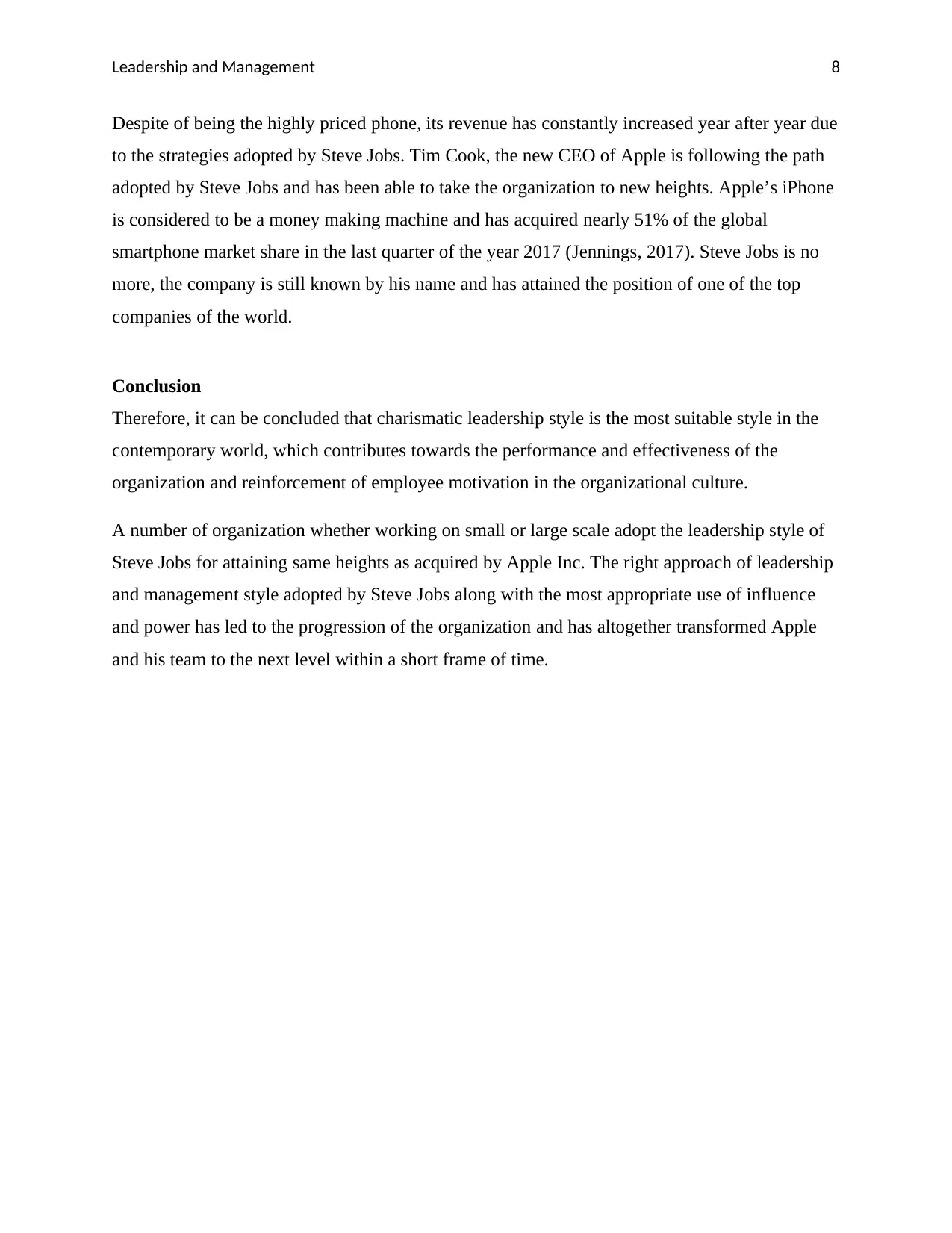
Leadership and Management 8
Despite of being the highly priced phone, its revenue has constantly increased year after year due
to the strategies adopted by Steve Jobs. Tim Cook, the new CEO of Apple is following the path
adopted by Steve Jobs and has been able to take the organization to new heights. Apple’s iPhone
is considered to be a money making machine and has acquired nearly 51% of the global
smartphone market share in the last quarter of the year 2017 (Jennings, 2017). Steve Jobs is no
more, the company is still known by his name and has attained the position of one of the top
companies of the world.
Conclusion
Therefore, it can be concluded that charismatic leadership style is the most suitable style in the
contemporary world, which contributes towards the performance and effectiveness of the
organization and reinforcement of employee motivation in the organizational culture.
A number of organization whether working on small or large scale adopt the leadership style of
Steve Jobs for attaining same heights as acquired by Apple Inc. The right approach of leadership
and management style adopted by Steve Jobs along with the most appropriate use of influence
and power has led to the progression of the organization and has altogether transformed Apple
and his team to the next level within a short frame of time.
Despite of being the highly priced phone, its revenue has constantly increased year after year due
to the strategies adopted by Steve Jobs. Tim Cook, the new CEO of Apple is following the path
adopted by Steve Jobs and has been able to take the organization to new heights. Apple’s iPhone
is considered to be a money making machine and has acquired nearly 51% of the global
smartphone market share in the last quarter of the year 2017 (Jennings, 2017). Steve Jobs is no
more, the company is still known by his name and has attained the position of one of the top
companies of the world.
Conclusion
Therefore, it can be concluded that charismatic leadership style is the most suitable style in the
contemporary world, which contributes towards the performance and effectiveness of the
organization and reinforcement of employee motivation in the organizational culture.
A number of organization whether working on small or large scale adopt the leadership style of
Steve Jobs for attaining same heights as acquired by Apple Inc. The right approach of leadership
and management style adopted by Steve Jobs along with the most appropriate use of influence
and power has led to the progression of the organization and has altogether transformed Apple
and his team to the next level within a short frame of time.
⊘ This is a preview!⊘
Do you want full access?
Subscribe today to unlock all pages.

Trusted by 1+ million students worldwide
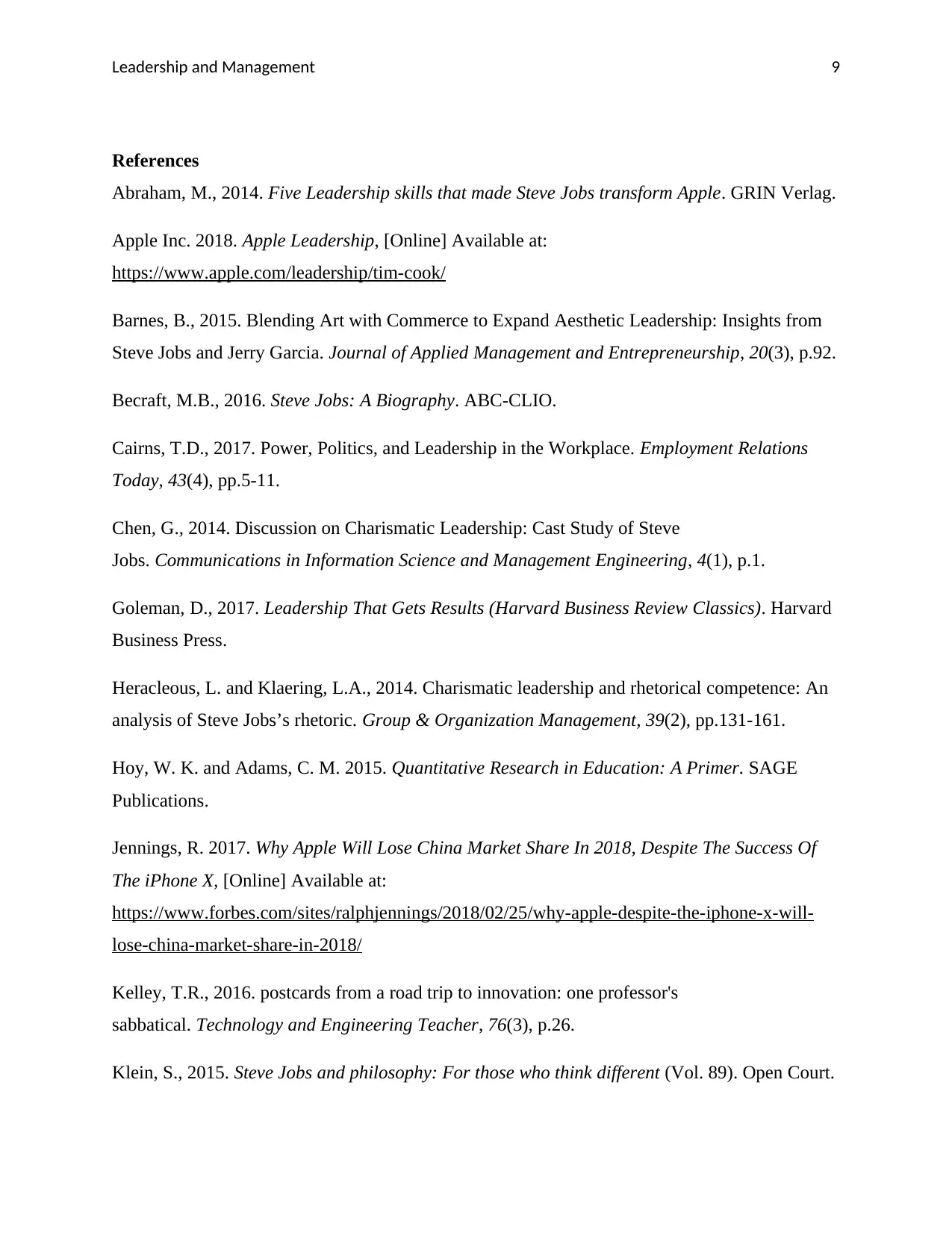
Leadership and Management 9
References
Abraham, M., 2014. Five Leadership skills that made Steve Jobs transform Apple. GRIN Verlag.
Apple Inc. 2018. Apple Leadership, [Online] Available at:
https://www.apple.com/leadership/tim-cook/
Barnes, B., 2015. Blending Art with Commerce to Expand Aesthetic Leadership: Insights from
Steve Jobs and Jerry Garcia. Journal of Applied Management and Entrepreneurship, 20(3), p.92.
Becraft, M.B., 2016. Steve Jobs: A Biography. ABC-CLIO.
Cairns, T.D., 2017. Power, Politics, and Leadership in the Workplace. Employment Relations
Today, 43(4), pp.5-11.
Chen, G., 2014. Discussion on Charismatic Leadership: Cast Study of Steve
Jobs. Communications in Information Science and Management Engineering, 4(1), p.1.
Goleman, D., 2017. Leadership That Gets Results (Harvard Business Review Classics). Harvard
Business Press.
Heracleous, L. and Klaering, L.A., 2014. Charismatic leadership and rhetorical competence: An
analysis of Steve Jobs’s rhetoric. Group & Organization Management, 39(2), pp.131-161.
Hoy, W. K. and Adams, C. M. 2015. Quantitative Research in Education: A Primer. SAGE
Publications.
Jennings, R. 2017. Why Apple Will Lose China Market Share In 2018, Despite The Success Of
The iPhone X, [Online] Available at:
https://www.forbes.com/sites/ralphjennings/2018/02/25/why-apple-despite-the-iphone-x-will-
lose-china-market-share-in-2018/
Kelley, T.R., 2016. postcards from a road trip to innovation: one professor's
sabbatical. Technology and Engineering Teacher, 76(3), p.26.
Klein, S., 2015. Steve Jobs and philosophy: For those who think different (Vol. 89). Open Court.
References
Abraham, M., 2014. Five Leadership skills that made Steve Jobs transform Apple. GRIN Verlag.
Apple Inc. 2018. Apple Leadership, [Online] Available at:
https://www.apple.com/leadership/tim-cook/
Barnes, B., 2015. Blending Art with Commerce to Expand Aesthetic Leadership: Insights from
Steve Jobs and Jerry Garcia. Journal of Applied Management and Entrepreneurship, 20(3), p.92.
Becraft, M.B., 2016. Steve Jobs: A Biography. ABC-CLIO.
Cairns, T.D., 2017. Power, Politics, and Leadership in the Workplace. Employment Relations
Today, 43(4), pp.5-11.
Chen, G., 2014. Discussion on Charismatic Leadership: Cast Study of Steve
Jobs. Communications in Information Science and Management Engineering, 4(1), p.1.
Goleman, D., 2017. Leadership That Gets Results (Harvard Business Review Classics). Harvard
Business Press.
Heracleous, L. and Klaering, L.A., 2014. Charismatic leadership and rhetorical competence: An
analysis of Steve Jobs’s rhetoric. Group & Organization Management, 39(2), pp.131-161.
Hoy, W. K. and Adams, C. M. 2015. Quantitative Research in Education: A Primer. SAGE
Publications.
Jennings, R. 2017. Why Apple Will Lose China Market Share In 2018, Despite The Success Of
The iPhone X, [Online] Available at:
https://www.forbes.com/sites/ralphjennings/2018/02/25/why-apple-despite-the-iphone-x-will-
lose-china-market-share-in-2018/
Kelley, T.R., 2016. postcards from a road trip to innovation: one professor's
sabbatical. Technology and Engineering Teacher, 76(3), p.26.
Klein, S., 2015. Steve Jobs and philosophy: For those who think different (Vol. 89). Open Court.
Paraphrase This Document
Need a fresh take? Get an instant paraphrase of this document with our AI Paraphraser
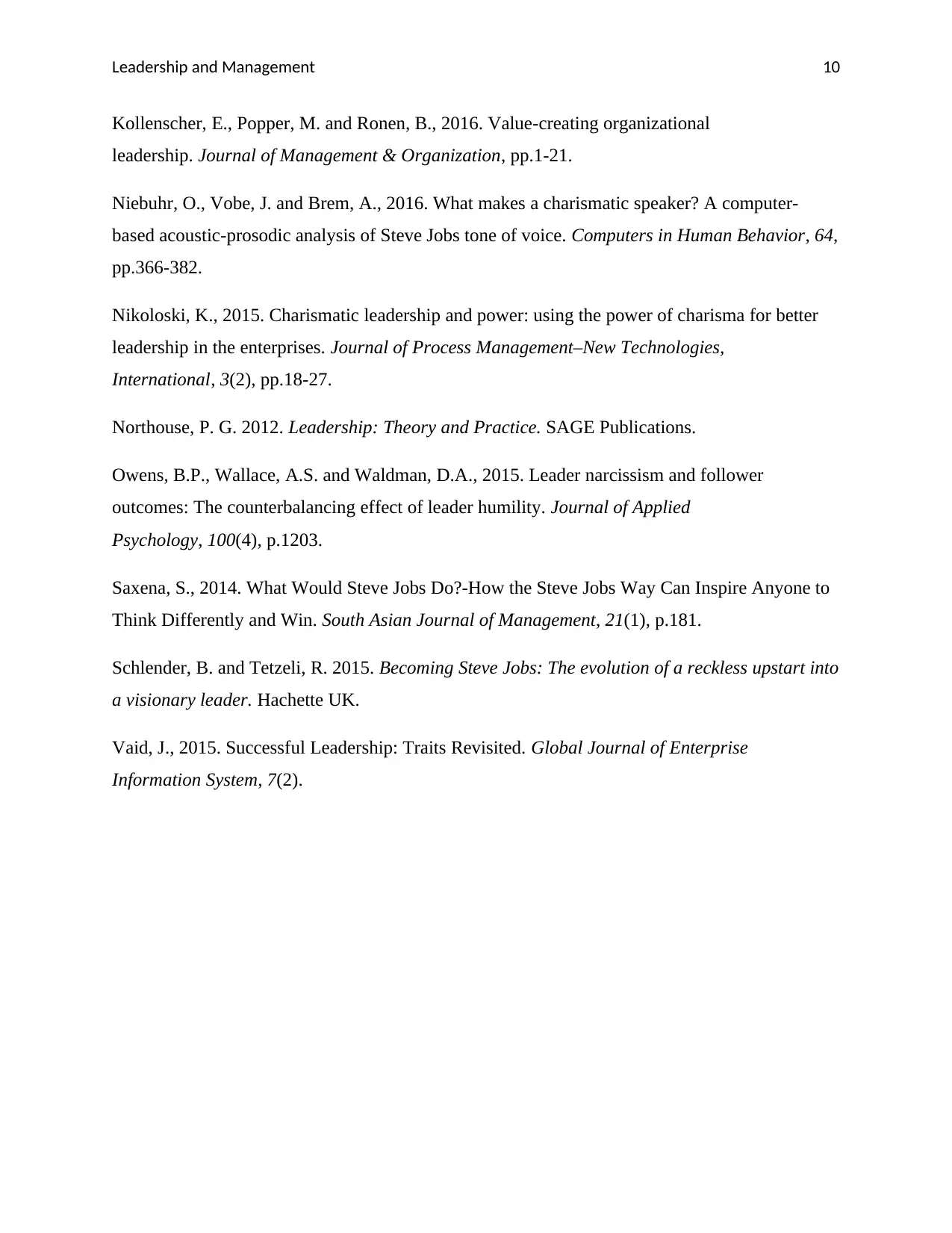
Leadership and Management 10
Kollenscher, E., Popper, M. and Ronen, B., 2016. Value-creating organizational
leadership. Journal of Management & Organization, pp.1-21.
Niebuhr, O., Vobe, J. and Brem, A., 2016. What makes a charismatic speaker? A computer-
based acoustic-prosodic analysis of Steve Jobs tone of voice. Computers in Human Behavior, 64,
pp.366-382.
Nikoloski, K., 2015. Charismatic leadership and power: using the power of charisma for better
leadership in the enterprises. Journal of Process Management–New Technologies,
International, 3(2), pp.18-27.
Northouse, P. G. 2012. Leadership: Theory and Practice. SAGE Publications.
Owens, B.P., Wallace, A.S. and Waldman, D.A., 2015. Leader narcissism and follower
outcomes: The counterbalancing effect of leader humility. Journal of Applied
Psychology, 100(4), p.1203.
Saxena, S., 2014. What Would Steve Jobs Do?-How the Steve Jobs Way Can Inspire Anyone to
Think Differently and Win. South Asian Journal of Management, 21(1), p.181.
Schlender, B. and Tetzeli, R. 2015. Becoming Steve Jobs: The evolution of a reckless upstart into
a visionary leader. Hachette UK.
Vaid, J., 2015. Successful Leadership: Traits Revisited. Global Journal of Enterprise
Information System, 7(2).
Kollenscher, E., Popper, M. and Ronen, B., 2016. Value-creating organizational
leadership. Journal of Management & Organization, pp.1-21.
Niebuhr, O., Vobe, J. and Brem, A., 2016. What makes a charismatic speaker? A computer-
based acoustic-prosodic analysis of Steve Jobs tone of voice. Computers in Human Behavior, 64,
pp.366-382.
Nikoloski, K., 2015. Charismatic leadership and power: using the power of charisma for better
leadership in the enterprises. Journal of Process Management–New Technologies,
International, 3(2), pp.18-27.
Northouse, P. G. 2012. Leadership: Theory and Practice. SAGE Publications.
Owens, B.P., Wallace, A.S. and Waldman, D.A., 2015. Leader narcissism and follower
outcomes: The counterbalancing effect of leader humility. Journal of Applied
Psychology, 100(4), p.1203.
Saxena, S., 2014. What Would Steve Jobs Do?-How the Steve Jobs Way Can Inspire Anyone to
Think Differently and Win. South Asian Journal of Management, 21(1), p.181.
Schlender, B. and Tetzeli, R. 2015. Becoming Steve Jobs: The evolution of a reckless upstart into
a visionary leader. Hachette UK.
Vaid, J., 2015. Successful Leadership: Traits Revisited. Global Journal of Enterprise
Information System, 7(2).
1 out of 11
Related Documents
Your All-in-One AI-Powered Toolkit for Academic Success.
+13062052269
info@desklib.com
Available 24*7 on WhatsApp / Email
![[object Object]](/_next/static/media/star-bottom.7253800d.svg)
Unlock your academic potential
Copyright © 2020–2026 A2Z Services. All Rights Reserved. Developed and managed by ZUCOL.





